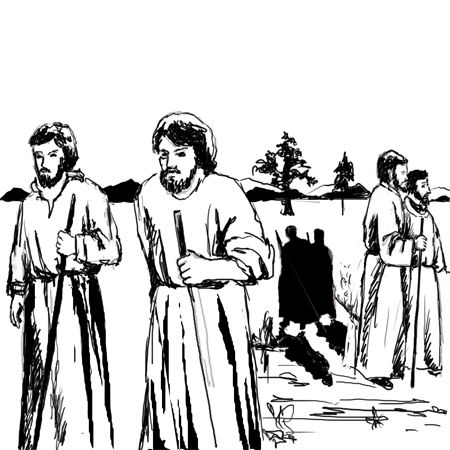15 Sunday of the Year B
Am 7:12-15; Eph 1:3-14; Mk 6:7- 13
If anyone asks which foreigner is respected most in a host country, most people would say it is an ambassador. When a president or head of state receives an ambassador, he acknowledges the country that sent him. When his government falls, the ambassador no longer represents any country.
 Jesus himself also uses this human concept of being sent to continue the preaching of his kingdom. In today’s gospel, Jesus sent his apostles to preach the need of repentance and drive out demons and anoint the sick with oil (Mk 6:12-13).
Jesus himself also uses this human concept of being sent to continue the preaching of his kingdom. In today’s gospel, Jesus sent his apostles to preach the need of repentance and drive out demons and anoint the sick with oil (Mk 6:12-13).
He told them to wear sandals and bring only a walking staff - no food, no sack, no money in their pockets, not a second tunic. If we interpret Jesus’ instructions literally, then most of the modern missionaries are missing the point. According to Jesus’ instructions, the apostles should not bring a bag, or food, or money or a second tunic. However, modern missionaries carry two or three suitcases of clothes and belongings, money and even a visa or master card.
Jesus’ instructions in today’s gospel are also different from the instructions recorded in the gospels of Matthew and Luke concerning missionaries’ belongings (Mt 10:5:15; Lk 9:1-6). The reason for the differences may be due to their different memories. This point tells us it is not necessary to interpret Jesus’ instructions literally. We need scripture scholars to help us understand Jesus’ instructions on how to travel on missionary journeys. We also rely on the church to interpret the scripture because the Church was entrusted with the mission to safeguard God’s word from being misinterpreted. Thus, details of what to bring for missionary journeys are not essential. What Jesus tells them is they are to bring basic needs only. The basic needs at that time in Palestine were different from basic needs in our time in the modern world. To preach the gospel in rich countries, they are to live in this way, but in poor countries, they are to live differently.
In any circumstance, they are to live a simple life style so that the message of the gospel may stand out. The Lord wants to teach them to put their trust and faith in God’s providence. The Gospel of Matthew and Luke of the same story tell us: the laborer deserves his wage (Mt 10:10; Lk 10:7).
If we follow the details literally as to what to bring for the missionary journey, we will forget the importance of preaching God’s word. Given authority to preach the gospel by Jesus, the apostles then gave authority to their successors, the bishops. The diocesan bishops in turn gave authority to the clergy to preach. The Decree on the Ministry and Life of Priests stated: Christ, through the apostles themselves, made their successors, the bishops, sharers in His consecration and mission. The office of their ministry has been handed down, in a lesser degree indeed, to the priests. (Priestly Life and Ministry # 2).
They received authority to preach by the laying on of hands in the sacrament of holy orders. In the Old Testament, God sent his prophets to speak to his people in his name. The instrument, which God uses, does not depend on our social status, educational level or human skill, but on God’s grace and his power and our cooperation. This was proved by God’s selection of Amos, a shepherd and a dresser of sycamores to prophesy to the northern Israelites and Jesus’ selection of the apostles, mostly fishermen with less education.
With reasoning and observation, we can also see how authority in the church was handed down. It was aimed to maintain unity in the mystical body of Christ so that apostolic activities can be coordinated and harmonized. If authority is not handed down in order, people might fight for influence and gain, difficult to be united. The history of the Christian world has proved that. Looking around and afar, we can see hundreds of different Christian denominations in the world. To disagree on something important, they can separate themselves in order to establish a new denomination. Activities in the Church are aimed not only at unity, but also at communion with the vine, that is Christ and the branches, that is Christians by sentiment and grace. Communion is a characteristic of the Catholic Church. Other denominations, political or social parties may be of unity, but not in communion. Communion implies unity, participation and shared feeling in grace, sentiment and desire. For instance, a concern of the leader of the church must be a concern of the whole church.
When there is joy, sadness or concern in the church, the clergy and laity share that sadness, joy and concern. The communion of joy, sadness and concern is not only shared in thought, but also in feeling and prayer. To use a Latin expression, it is called sentire cum ecclesiae. That is what Saint Paul wrote: Rejoice with those who rejoice, weep with those who weep (Rom 12:15).
Prayer for unity and communion with the Church:
Oh Lord Jesus, the eternal shepherd!
We thank you for your institution of the church
on the foundation of the apostles.
May the bishops, priests, religious men and women
be united and in communion with the successor of Peter
in preaching the good news of salvation.
Teach me to cooperate in the apostolic work
in order to maintain unity and communion
with the Church. Amen.
John Tran Binh Trong
